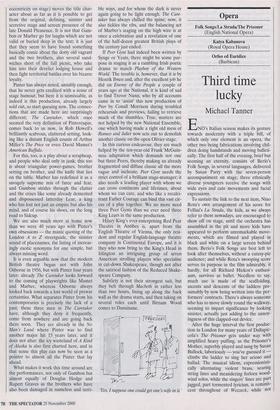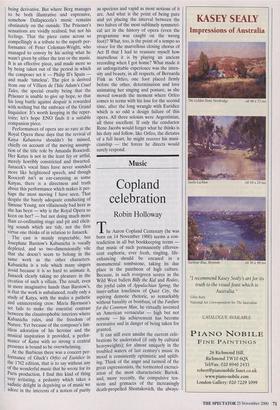Opera
Katya Kabanova (Royal Opera House)
Third time lucky
Michael Tanner
NO's Italian season makes its gesture towards modernity with a triple bill, of which only one element is an opera, the other two being fabrications involving chil- dren doing handstands and moving balleti- cally. The first half of the evening, brief but seeming an eternity, consists of Berio's Folk Songs, in several languages, delivered by Susan Parry with the seven-person accompaniment on stage; three ethnically diverse youngsters receive the songs with wide eyes and cute movements and facial expressions.
To sustain the link to the next item, Nino Rota's own arrangement of his score for Fellini's La Strada, the kids, as we always refer to them nowadays, are encouraged to show off on stage, until the orchestra has assembled in the pit and more kids have appeared to perform unremarkable move- ments, which are filmed and played in black and white on a large screen behind them. Berio's Folk Songs are best left to look after themselves, without a cutesy-pie audience; and while Rota's swooping score serves its purpose in the film admirably, it hardly, for all Richard Hickox's enthusi- asm, survives as ballet. Needless to say, much use is made of the scaffolding, ascents and descents of the ladders pre- sumably by now being written into the per- formers' contracts. There's always someone who has to move slowly round the walkway, seeming to impart significance by looking sinister, actually just adding to the annoy- ingness of this clapped-out device.
After the huge interval the first produc- tion in London for many years of Dallapic- cola's The Prisoner gets under way with amplified heavy puffing, as the Prisoner's Mother, superbly played and sung by Susan Bullock, laboriously — you've guessed it climbs the ladder to sing her arioso and ballad. The musical idiom, expressionisti- cally alternating violent brass, searing string lines and meandering forlorn wood- wind solos, while the singers' lines are part jagged, part tormented lyricism, is reminis- cent throughout of Wozzeck, while not being derivative. But where Berg manages to be both illustrative and expressive, somehow Dallapiccola's music remains obstinately on the outside. The Prisoner's sensations are vividly realised, but not his feelings. That the piece came across so compellingly is a tribute to the superb per- formance of Peter Coleman-Wright, who managed to convey by his acting what he wasn't given by either the text or the music. It is an effective piece, and made more so by being taken out of the period in which the composer set it — Philip II's Spain and made 'timeless'. The plot is derived from one of Villiers de l'Isle Adam's Cruel Tales, the special cruelty being that the Prisoner is unable to give up hope, so that his long battle against despair is rewarded with nothing but the embrace of the Grand Inquisitor. It's worth keeping in the reper- toire; let's hope ENO finds it a suitable companion piece.
Performances of opera are so rare at the Royal Opera these days that the revival of Katya Kabanova shouldn't be missed, chiefly on account of the moving assump- tion of the title role by Amanda Roocroft. Her Katya is not in the least fey or artful, merely horribly constricted and thwarted. Janacek's vocal lines have never sounded more like heightened speech, and though Roocroft isn't as ear-caressing as some Katyas, there is a directness and truth about this performance which makes it per- haps the most moving I have seen. That despite the barely adequate conducting of Simone Young, not villainously bad here as she has been — why is the Royal Opera so keen on her? — but not doing much more than co-ordinating stage and pit and elicit- ing sounds which are tidy, not the first virtue one thinks of in relation to Janacek.
The cast is mainly respectable, but Josephine Barstow's Kabanicha is vocally depleted, and so two-dimensionally vile that she doesn't seem to belong in the same work as the other characters. Kabanicha is a role which many singers avoid because it is so hard to animate it, Janacek clearly taking no pleasure in the creation of such a villain. The result, even in more imaginative hands than Barstow's, is that the work is unbalanced, really only a study of Katya, with the males a pathetic and uninteresting crew. Maria Bjornson's set fails to make the essential contrast between the claustrophobic interiors where Kabanicha rules, and the freedom of Nature. Yet because of the composer's lim- itless adoration of his heroine and the musical inspiration it provided, a perfor- mance of Katya with so strong a central presence is bound to be overwhelming.
At the Barbican there was a concert per- formance of Gluck's Orfeo ed Euridice in the 1762 edition, that is to say without any of the wonderful music that he wrote for its Paris production. I find this kind of thing very irritating, a pedantry which takes a sadistic delight in depriving us of music we adore in the interests of a notion of purity as specious and vapid as most notions of it are. And what is the point of being pure and yet placing the interval between the two halves of the most sublimely symmetri- cal act in the history of opera (even the programme was caught on the wrong foot)? What, too, is the point of a tempo so vivace for the marvellous closing chorus of Act II that I had to reassure myself how marvellous it is by playing an ancient recording when I got home? What made it an unforgettable experience was the inten- sity and beauty, in all respects, of Bernarda Fink as Orfeo, one foot placed firmly before the other, determination and love animating her singing and posture, as she moved towards the moment where Orfeo comes to terms with his loss for the second time, after the long wrangle with Euridice which is so odd a design failure of this opera. All three soloists were Argentinian, all three excellent. If only the conductor Rene Jacobs would forget what he thinks is his duty and follow, like Orfeo, the dictates of a full heart, he might recover his musi- cianship — the forces he directs would surely respond.






























































































 Previous page
Previous page